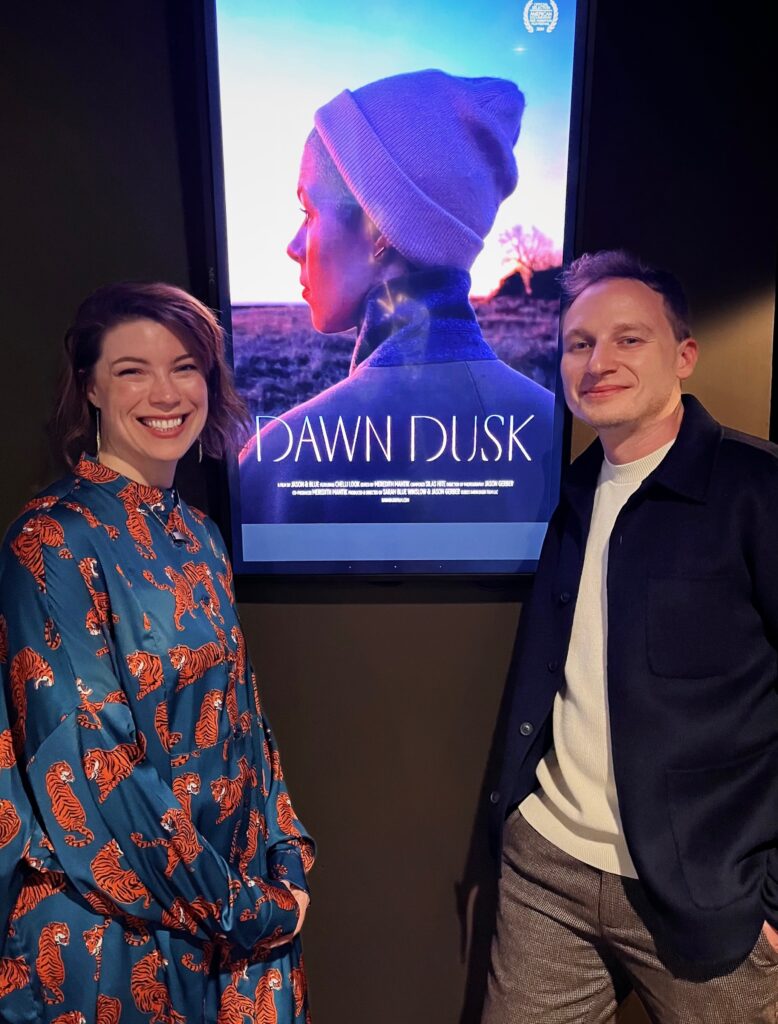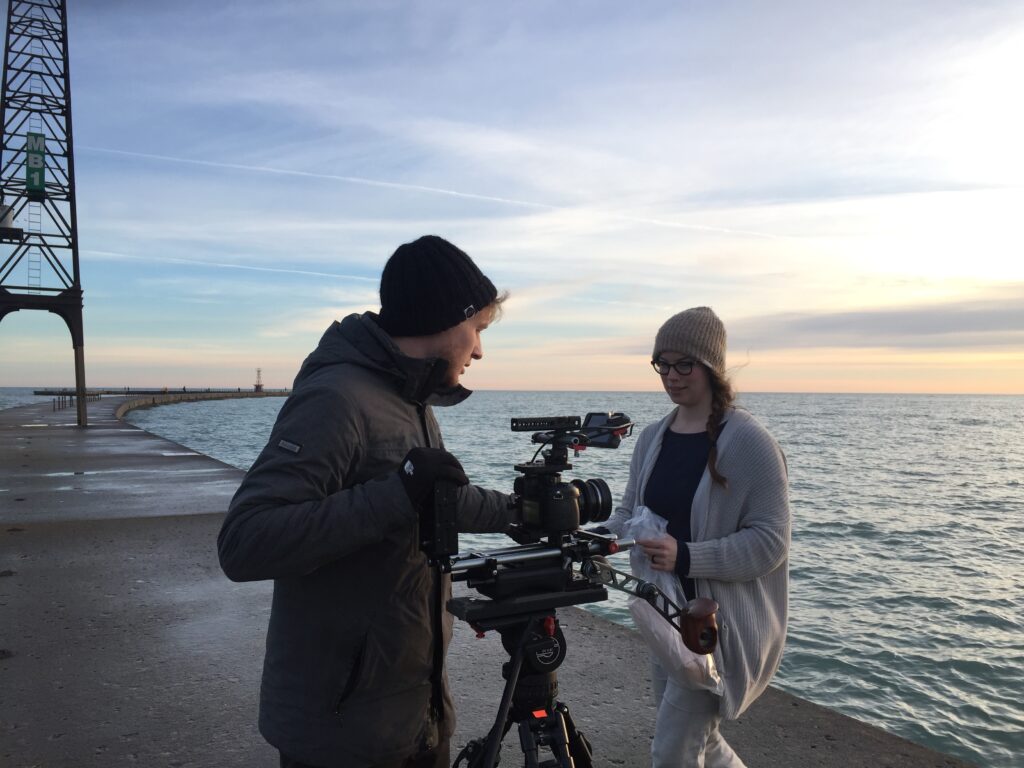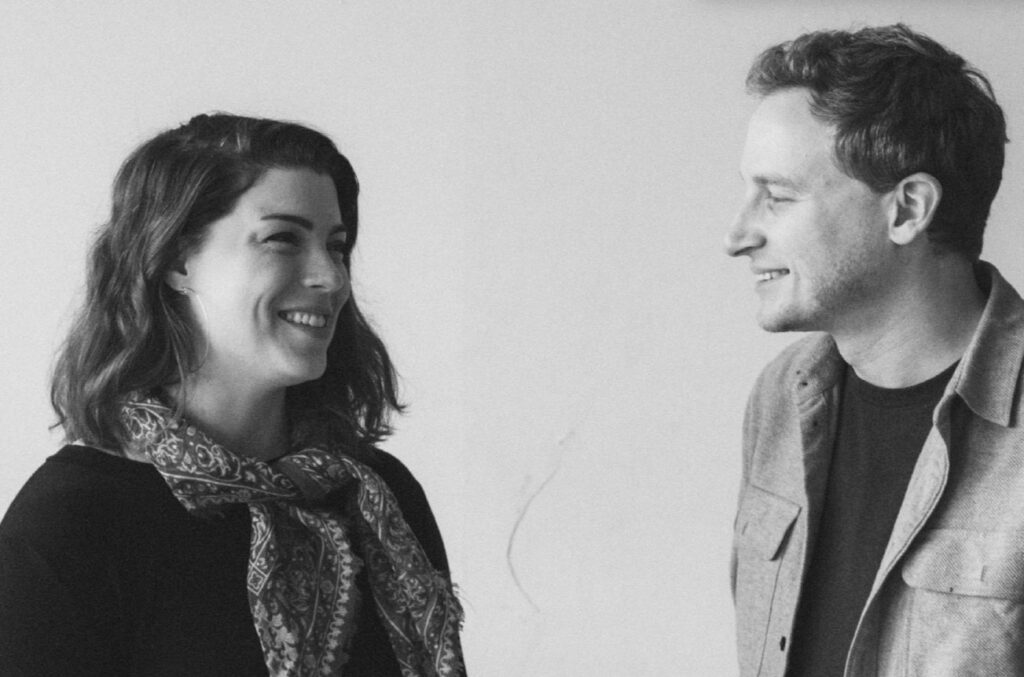Multidisciplinary artist Chelli Look, who may be best known for her work in the field of luxury leather goods, first encountered directors Blue and Jason Gerber at an open studio event. She began to open up to them about her artistic inspirations and eventually revealed that she had recently endured a painful loss. In an effort to process her grief, she began to channel her feelings of sadness and desperation into her art. The act of designing bags began to have a positive influence on her ability to mourn and gave her an outlet for the complicated emotions that she was wrestling with. The Gerbers were intrigued by this story and wanted to bring it to the screen in a non-exploitative, un-flashy manner.
Zita Short had the opportunity to interview them as the film prepares to play to wider audiences.
Zita Short: What drew you towards making this project?
Blue Gerber: We actually stumbled into it. We didn’t set out to make a feature film. We actually set out to make a short portfolio piece for our website. Little five minute pieces were popular at the time and we really liked those. We were thinking about doing that when a friend of a friend of Chelli’s invited us to an open studio that she was holding. We didn’t know her very well at the time. She was a friend of a friend. However, we went to her open studio and were really struck by her work. We approached her that evening and asked if she would be open to us making a short video about her. She was really interested and we scheduled a meeting over coffee for later that week. We asked her what she had been up to and how she got into the position that she is currently in.
She told us the story of her sister. We were really surprised by this story. We didn’t know how to process it. Our jaws dropped to the floor. We were really struck by it and just started filming with her. We were really struck by the fact that the story of her sister plays into every aspect of her art and life. We were very moved by that. We accepted that in order to honor this story and tell it in a proper manner we had to approach it in a certain way. We decided that it would have to be however long it needed to be and asked Chelli how she felt about that. We just continued to film and slowly realized that we had a feature film on our hands. In the editing process we had a lot to figure out. We needed to know what the heart of the film was.
Jason Gerber: We always say that we just fell into making a feature length documentary.
Zita Short: What is your background in the documentary film sphere?
Jason Gerber: We don’t strictly see ourselves as documentarians. We have worked in a lot of different fields in the film industry. We do a lot of work on commercials and short films. We have one that recently played on the Oprah Winfrey Network over Super Soul Sunday. It encouraged people to get out there and vote. These are the things we end up doing. Over time, I have become good at listening to what stories require visually and then executing that. In the case of Chelli’s story we wanted to be able to reflect her personality and her work. Which is so minimalistic and functional. We wanted the visual style of the film to reflect that. The movie isn’t selling a product in any way but that background in the world of advertising still has an influence. We were able to make her products look good in the context of the story. Our approach to filmmaking is unique because it’s so chameleonic. We can work in all these different modes and what you see in this documentary is an ability to step into a lot of new, unexpected spaces. We were always checking in with each other about what the story demanded of us as filmmakers. We wanted to consider what it means to pour your feelings into your art.
Blue Gerber: I would say that because Chelli is an artist she creates bags that really draw you in. We wanted to be able to capture the beauty of her art. In terms of the story aspect, we found it really interesting, having come from a narrative space. There were times when I wished that I could tell her to say X,Y, and Z. That is, obviously, not how documentary filmmaking works. We really had to lean into that and kind of journey alongside her as she explored her grief. She was looking to heal and we didn’t want to just lead her along. She was very independent during this process. We did make certain observations about the connection between her art and her healing process but we gave her a lot of space to grieve on her own terms and process all of this trauma.
Zita Short: What was it like trying to create a safe space for the subject of your documentary?
Blue Gerber: We were very sensitive when it came to this story. Chelli was dealing with a traumatic personal loss. That pain played into her art. Even when we were just talking about her art we had to deal with some of those deeper issues. I think some of those art-based questions could be a bit more lighthearted but they allowed her to open up to us. It also gave the audience more of an understanding of who she is. We really became friends and we were able to conduct long interviews with her. We sat with her for a long time and talked like friends would. Those early interviews helped us to ease into talking about more painful subjects. We always warned her about what we were planning to touch on so that she felt comfortable.
Jason Gerber: Some documentarians don’t need consent or dispense with asking for it but with Chelli we were constantly checking in and making sure everything was okay. It felt necessary.
Zita Short: How do you think this documentary responds to the zeitgeist?
Blue Gerber: We didn’t just want this to be another true crime drama about justice being served. We wanted to tell the story of what happens after something like this occurs. So often stories like this end with the perpetrator going to jail. It’s presented in this celebratory way but the families of the victims are still left with this awful sense of loss. So much of this documentary was about Chelli’s grief and her efforts to continue living her life in the face of so much personal trauma. Showing all these moments that don’t usually get presented proves that justice doesn’t just involve bad guys going to jail. Families have to go on struggling and learning to come to terms with their grief.
Chelli’s journey is so dominated by her moving past feeling trapped. She meets so many survivors of domestic violence and families of victims of domestic violence and it was very powerful to hear her sharing her own experiences. She encourages those who have been impacted to not remain under the control of those who have victimized them. Forgiveness does not mean saying that what happened was okay. It’s all about an inner process. We want people to see a story like this told in a way that isn’t flashy or headline-grabbing. It shouldn’t just be a headline. After watching this film, we hope that audience members feel a personal connection to this family and gain a deeper empathy for victims of domestic violence.
Jason Gerber: I think that we tend to sensationalize things like murder and a lot of situations like the one that Megan was in get turned into headlines. All of a sudden, these stories become true crime podcasts. We wanted to tell a different version of this story. We want to humanize the figures involved in this terrible tragedy. This movie isn’t just about the true crime aspect of the story but manages to place a focus on the lives of the people left behind. We want audiences to be challenged and forced to consider what it means to forgive. We want to reframe some of the sensational elements of domestic violence. I think that these things are represented in a crude, insensitive manner in a lot of media. This film is for people who are going on all sorts of different grief journeys. Their therapeutic process might be different but the emotions are the same. I think that people from all walks of life will be able to relate to this.
Zita Short: This documentary places a considerable emphasis on the reparative qualities of creating art. What do you think you bring to the table, as artists, in capturing another artist at work?
Blue Gerber: What we tried to do in the film is focus on Chelli’s creative process. She describes her inspiration for different pieces in the collection and she makes note of how sunrises and sunsets had a big influence on her work. She eventually reveals that they held so much importance for her because they were faithful to her at a time when she was struggling deeply with grief. They were very stable and steady at a time in her life when everything felt so tumultuous and dark. The sun would faithfully rise every morning and she found herself increasingly turning towards religion as part of her healing process.
Each bag has certain features that correspond to different forms of light and she talks a lot about the inspiration behind them. We have this sequence where you see all of the pieces that she has created and the styles of light that they were inspired by. She wanted her ‘Halo Clutch’ to have a round shape like a halo. As these are wearable pieces of art, she touches on that in the film. We get to see these pieces being worn by models and that was how we felt we could honor her experiences in our own way. She really weaves her personal story into her art and we were able to tell that story through this visual sequence at the end.
Jason Gerber: We made this film as reflective of Chelli as possible. The bag sequence was coming from us. We wanted to consider what we could bring to the table. We were looking at the shades of light that we find beautiful and my favorite kind of light is dappled. We get to see the light reflecting through the leaves and onto the grass. That approach made sense because this was not a photoshoot that Chelli was directing. We were looking at what a particular season in a particular artist’s life looks like. This was the outcome.
Zita Short: There has been a lot of controversy around the sensationalistic treatment of serious issues like murder and domestic violence in true crime documentaries. Do you think we could be seeing a turn away from this directorial approach in the present moment?
Blue Gerber: Documentaries have often been very exploitative in their approach to telling human, personal stories. I think we are seeing a move towards the production of more intimate documentaries that focus on smaller stories. These are more localized stories but they matter just as much as big, sensational stories.
Jason Gerber: We are also talking a lot more about mental health. In this film, the theme of mental health plays a big role. We get to witness Chelli wrestling with her mental health struggles while grieving. She is processing those things and processing her emotional journey. Talking about grief and your stages of healing has historically been stigmatized. They were definitely stigmatized when I was growing up. Having a more open discussion about these things could open people up and encourage people to be less uptight about these things. It sort of feels like we could be approaching a turning point but there’s also this massive divide. We want to believe that we’re moving forward but there are also these regressive forces pulling us backwards.
Zita Short: Is there any media that you have consumed recently that you would recommend to readers?
Jason Gerber: I would recommend Kelly Reichardt’s First Cow (2019). It’s the best film I’ve seen all year. I was very struck by this film that focuses on a very sensitive man who loved hospitality and is trying to make it in the West. It was a non-traditional Western and buddy movie. It was interesting to see these two curious fellows in an Old West setting. It’s a very unique film and I think people should seek it out. We actually got to meet the director of photography for the film at a film festival earlier this year. We told him what a great job he did.
Blue Gerber: A couple of years ago I saw More Than Ever (2022). It was a very moving, sad, poignant film about grief and struggling with ongoing illness. It was very emotionally moving and beautiful. It was directed by Emily Atef and I would highly recommend seeing it. I got to hear a Q and A with her after a screening and hearing about her motivations behind making the film was so intriguing. It’s a very difficult film about a painful decision that a couple has to make. Ultimately they don’t see eye to eye. It’s all about whether you can continue loving someone while they’re going through a very tragic situation. It’s a beautiful film that makes you think about how you honor the people you love.








